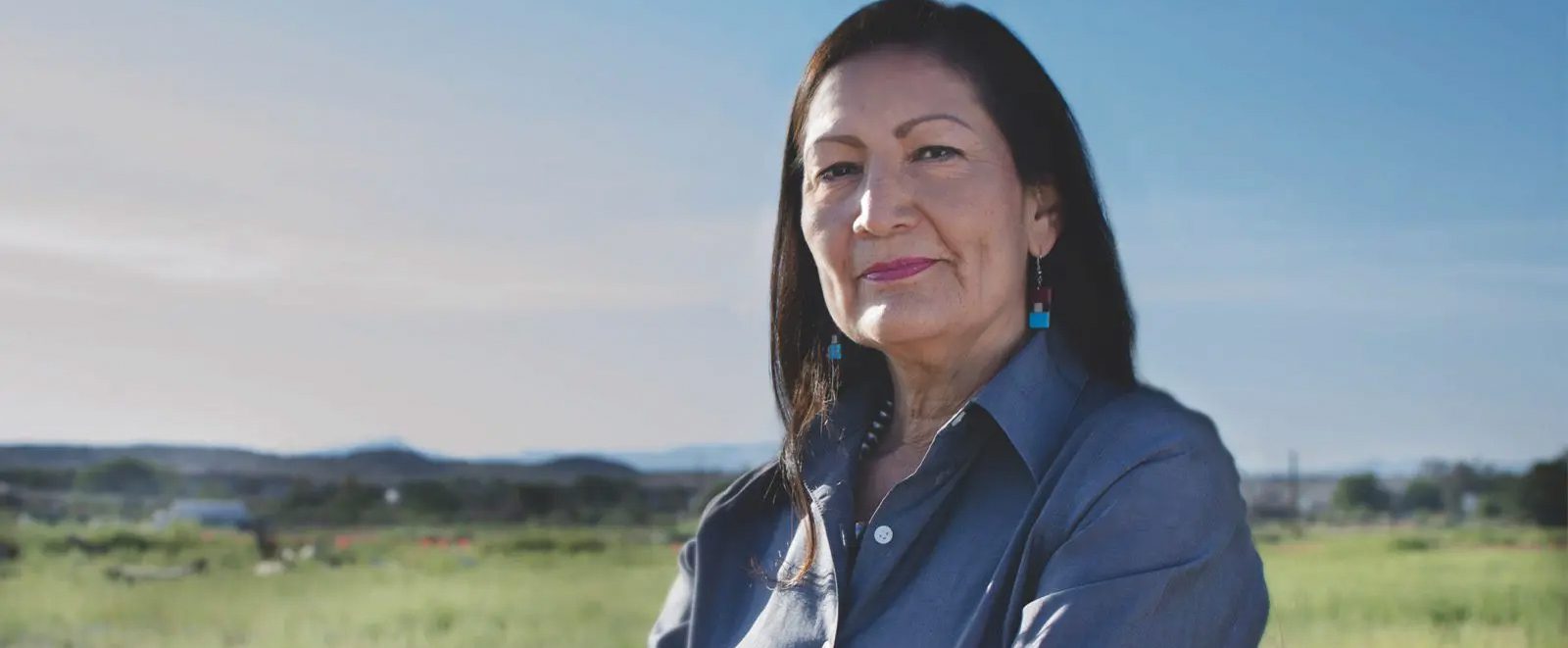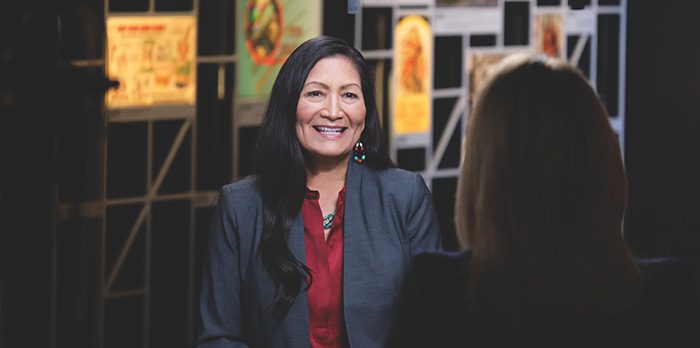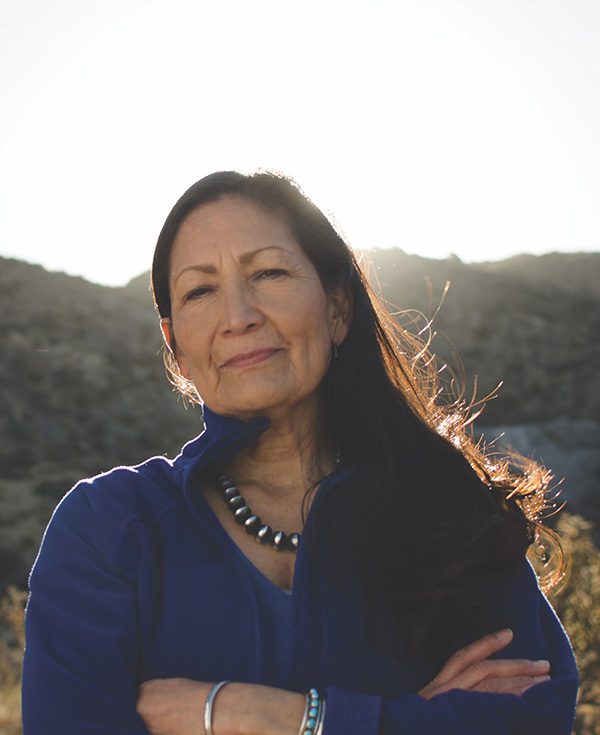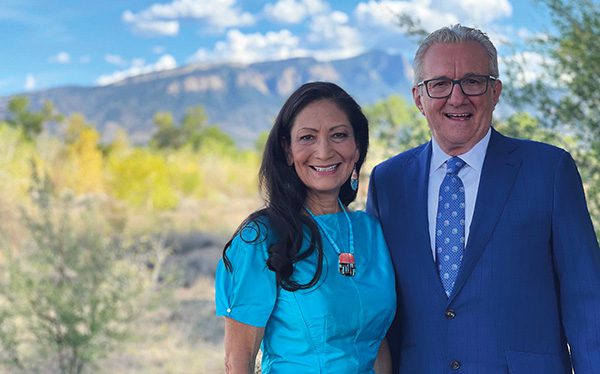
Deb Haaland: One for the History Books
The first Native American to head the Department of Interior stays grounded in Pueblo culture
Deb Haaland (’94 BA, ’06 JD) calls herself a 35th-generation New Mexican, tracing her family tree on her mother’s side to the establishment of Laguna Pueblo in the 1200s. Born in Winslow, Ariz., to a Laguna mother and an Anglo father from Minnesota, Haaland grew up as a military brat; her mother served in the Navy and her father in the Marine Corps and the family moved frequently with each of her father’s postings.
A single mother who has been open about her 30-plus years of sobriety, her housing insecurity and her reliance on public assistance, Haaland walked a rough road that led – in 2018 when she was 58 – to election to the United States Congress, representing New Mexico’s 1st Congressional District.
She was one of two Native American women elected to Congress that year – a first for the country. And this March, Haaland notched another historic first becoming the first Native American to serve as a Cabinet secretary when she was sworn in as Secretary of the Interior.
Haaland now heads a massive federal department with 70,000 employees and missions that range from managing the National Parks and Bureaus of Land Management and Reclamation to overseeing Indian education and the trust relationship between the federal government and 574 federally recognized American Indian and Alaska Native tribes and villages.

Haaland is interviewed by Norah O’Donnell for CBS Evening News in April. Photo: Department of Interior
Mirage: I’m always interested in families and the relationship between our family and who we are. Your family background is a combination of Pueblo culture, Anglo culture and also military culture. How do you think your parents and grandparents shaped who you are today?
Haaland: The military part of it, my dad got his orders every couple of years and there was never any fight or question. We just packed up and moved to wherever the commander in chief instructed him to move. I feel like that part of my life has given me a real opportunity to sort of adapt to things very easily. You have to make new friends wherever you go; it’s a new house, new neighborhood, all of those things. So, I feel grateful for that. I actually feel like I was able to adapt really well to so many different types of situations and so I feel like that’s something that the military life does for a person.
With that being said, whenever my dad had a temporary duty station, meaning he was there for six months or a year, my mom would make sure that we went to stay with my (Laguna) grandparents during that time. She was adamant for us having an opportunity to grow up with my grandparents and have them in our lives. They were part of the assimilation policies. Not only did they go to boarding schools but they worked on the railroad in Winslow, Ariz. My grandfather was a diesel train mechanic for 45 years and my grandmother cleaned diesel train engines. Sometimes when we would go visit them it was Winslow. Other times it was to Laguna.
I learned how to cook from my grandmother just by watching her through the kitchen window. She didn’t like kids in her kitchen. She moved entirely too fast and you’d get run over if you even tried! And then I’d spend time at Laguna with my grandfather in his fields. He grew corn and there were fruit trees that he would irrigate. We’d pull weeds, pick worms off the corn. So, I feel like it was because of my mom, who really insisted that we learn everything that we could from our grandparents, that I have that incredible perspective. When we got older of course it was hiking on the mesas and climbing rocks and all of that so I got a good taste of the outdoors as well.
My grandmother was from Mesita Village. We’re matrilineal and we follow our mother’s side.
Mirage: She really kept you grounded with Pueblo culture even though you had a very urban childhood and were moving all over the place.
Haaland: I went to 13 public schools before graduating from Highland High School in Albuquerque.

Haaland: I was working at Zinn’s Bakery. I started that job when I was in high school. I walked to work every day after school. And when I graduated from high school, they offered me a full-time job. So, I took that and I just worked. It was important that I make a living by myself. My dad wasn’t the type to let anyone sit around the house, so not working was out of the question.
You know, I just woke up one morning and asked myself, “Am I going to be doing this for the rest of my life?” And the answer clearly was no. And at that point I called my sister, I called my mom and I asked them, “Should I go to college?” And of course, they said absolutely. Neither one of my parents graduated from college. I didn’t have a lot of people telling me I should go to college. So now I do that as a role model for kids. I just plant the seed sometimes. If I’m the only one asking them, you know, “Think about going to college,” then it’s absolutely important that I raise that.
Mirage: The path to college for a first-generation college student is a tough one. It took you awhile to graduate. I’m assuming you worked your way through?
Haaland: I was working. There were family obligations. I just wanted to do well and I thought if I don’t overload myself that I should be able to do well. And it was fine. Things happen the way they’re supposed to, I guess.
Mirage: And you were 34 and quite pregnant when you graduated. (Her only child Somah was born four days after graduation.) That sounds like a lot. And then you had a degree, you had a toddler and you started your own business, Pueblo Salsa.
Haaland: Yes, I kept that alive until I was in law school.
Mirage: Was that about the flexibility of being a single mom and being able to make your own hours?
Haaland: That was part of it definitely. I didn’t want to put my child in day care. I just felt very strongly that children in those young ages, it just lasts for such a short time, I felt very confident that if I kept her with me as much as possible, I would have a strong influence over her life. And as it is, they’re doing pretty well.
Mirage: Yeah, I looked at their social media. Cool kid! You’ve raised a really interesting adult who’s very impressive. I read a piece by Julian Brave Noise Cat in which he described in a really sensitive way this period of time when you really didn’t have enough food, were really down to nothing in the cabinet, and applied for food stamps. Can you talk about your financial struggles and how you coped?
Haaland: Right. Oh, my goodness. It’s tough. And so I understand that. It’s tough for so many people in this country. If I had all the money that I spent in overdraft fees, right? You just hold your breath every day because you’re worried about being able to keep things going, keep a roof over your head. I relied on friends and I relied on family. But I recognize that’s not a foolproof way to gain financial footing, either. That’s why I’ve been very adamant about helping to level the playing field. Equity is an issue in this country that we absolutely need to work on and deal with. People need to be able to support themselves. I remember filling out my application for food stamps and then telling me you don’t qualify for emergency food stamps and I just started crying in the counselor’s office. I know what it’s like to have to put food back when you’re at the checkout line because you don’t have enough money to pay for it.
Mirage: When you did decide to go to law school, were you thinking of a career as a practicing attorney or were you thinking of about getting into politics and just these kinds of social justice issues we’re talking about?
Haaland: You know, when I was in undergraduate, I had to take English 100 when I started because I didn’t score high enough on my standardized test, and my writing instructor would give us extra credit for going to lectures around the university and writing an essay about the lecture. And one of the first ones I went to outside of class was to listen to John Echohawk from the Native American Rights Fund. I was so impressed with him and his journey and work he was doing. He inspired me. And later on in my undergraduate career I took a class from Fred Harris, former senator from Oklahoma. He taught political science and he inspired me further. So I thought between those two I needed to go to law school.
Mirage: And after you graduated from law school, it was a law professor who put on the path of politics? Encouraged you to volunteer?
Haaland: My constitutional law professor invited me to apply to Emerge New Mexico and so I did that. I applied to Emerge New Mexico and the rest is history, I guess. I recognized that I could make an impact on things. Thereafter I just really dug in and started helping folks get out to vote. I was joined, of course, by many folks who feel passionate about our right to vote and so I was in really good company and have been for a long time.
Mirage: The rest is history! I look at your career as starting rather late in life, but then just taking off. From 2012 working for the Obama campaign to 2018 being in Congress yourself, that is a very short period of time. Did it seem like a real life-changing whirlwind?
Haaland: It’s a good chunk of years, so it doesn’t necessarily feel like a whirlwind. But sometimes I stop to think how much has happened. I look through photographs I’ve taken that sort of document what I’ve done throughout the years and I think, yes, an awful lot has happened. It’s been wonderful. I’ve made some strong and beautiful friendships across the state. So it’s been great. And I’m still in touch with my college professors from UNM.
Mirage: When you were nominated for this job you spoke about the impacts of climate change and environmental injustice and the Interior Department addressing those issues. I wondered what you see as the core, the theme, of the work that you want to do.
Haaland: Climate change is real and if anyone thinks we’re not facing a climate crisis right now, I don’t understand that. It was a month ago or something the highest carbon levels ever recorded in the history of our world were recorded. So it’s an urgent issue. When you read the front page every day, they’re either talking about drought or wildfires. Our world is definitely changing. And I feel that every single American can participate in this new era that needs to happen and I really hope that every single person gets on board.
Mirage: You are famously the first Native American in charge of this agency and it’s an agency that has such a terrible history with Native Americans. So this isn’t just academic or policy for you – this is personal, right? Do you see that as an opportunity? Does it weigh on you?
Haaland: You know every position I’ve had weighs on me. If you’re a leader in anything you’re in that position because you care deeply about the issues, and I do. I care deeply. However, I feel very blessed that I’ve gotten so much support. For most things that I’ve done, even when I was a member of Congress, I had support across the country for the things that are important that we want to accomplish. So, I feel like I’m standing on the shoulders of so many people who came before me who worked hard to conserve our environment, who worked hard to bring issues to the forefront so that people will care about them and I feel like I am sort of honoring those people’s legacy and that’s a part of how I feel about the job that I have now. Many folks have come before me and I really need to stay on that trajectory.
Mirage: I’m curious how you stay grounded and connected – healthy physically and mentally in this period in your life.
Haaland: I’m a runner. I’ve been running for the last 20 years. And that absolutely keeps me grounded. Yesterday morning I got outside and ran eight miles. It was a beautiful New Mexico sunrise. I’m here in New Mexico and I’m going back to D.C. later today. I pack my suitcase with red chile and green chile and corn tortillas. I eat New Mexican food whenever I’m home. My mother taught us that those traditional foods. Yes, they keep your body healthy, but they also feed your soul, because we have a very strong tradition of agriculture here in New Mexico. When you partake of that it feeds your spirit as well.
Mirage: Are you training for any races right now?
Haaland: I am. I’m signed up for the Marine Corps Marathon Oct. 29.
Mirage: Is eight miles for a short run or a long run?
Haaland: When you train for a marathon, you increase your mileage incrementally. So I’m at eight miles. The next time I’ll run 10 and go up from there, my longest run being 20 miles before the marathon.
Mirage: Anything else you’d like to touch on about UNM?
Haaland: I would just say to the students at UNM, you’re so fortunate to be at an amazing university. It’s a close-knit community, everyone cares about each other. I loved my time there and I keep that tradition going.
My child, Somah, also graduated from UNM in the Theater Department in 2017. And so both of us, we recognize the value of being at hometown university like UNM. So just keep up the good work.
Mirage: So, a proud Lobo mom?
Haaland: Absolutely!

photo: Department of Interior
Haaland married longtime partner Skip Sayre in August at the the Hyatt Regency Tamaya at Santa Ana Pueblo.
Haaland isn’t the only alumnus joining the Biden-Harris administration in high-profile policy positions.
Libby Washburn (’98 JD), formerly the chief compliance officer and chief of staff in the President’s Office at UNM, now serves as in the White House as Special Assistant to the President for Native Affairs.
A member of the Biden-Harris administration’s Domestic Policy Council, Washburn is involved in all aspects of the government-to-government relationships between the United States and American Indian and Alaska Native tribes.
Washburn is no stranger to the federal government.
She served as state director and legislative counsel for U.S. Sen. Jeff Bingaman and as the chief of staff to the Deputy Secretary of the U.S. Department of the Interior in the Obama-Biden administration and at the Bureau of Reclamation.
Washburn earned a bachelor’s degree in journalism from the University of Oklahoma in 1994, a master’s in government from Texas Woman’s University in 1995 and her law degree from UNM in 1998.
Washburn, a citizen of the Chickasaw Nation of Oklahoma, served as UNM’s chief compliance officer from 2016 to September 2018, and was appointed chief of staff by interim President Chaouki Abdallah and continued in the role under President Garnett S. Stokes. Washburn left UNM in 2018 to move to Iowa with her husband, UNM School of Law Dean Kevin Washburn, when he became dean of the University of Iowa School of Law.
Xochitl Torres Small (’15 JD), who served one term in the U.S. Congress representing New Mexico’s Second District, has been nominated to serve as Under Secretary of Rural Development in the U.S. Department of Agriculture.
In announcing the nomination, the White House said, “Throughout her career, Torres Small has employed her experience organizing in vulnerable, rural communities to achieve lasting investments that combat persistent poverty.”
Torres Small, the granddaughter of migrant farmworkers who grew up in Las Cruces, left home at age 16 to attend United World College’s college in Eswatini, then known as Swaziland.
She then attended Georgetown University in Washington, D.C., graduating with a bachelor’s degree in 2007, and returned home to work as a field organizer in colonias in southern New Mexico.
In 2008, she came home from college to work. She went to work as a field representative for Senator Tom Udall (’77 JD) in 2012, working worked on issues ranging from water conservation and infrastructure development to education and healthcare accessibility and helping communities in New Mexico access American Recovery and Reinvestment Act funds. Inspired by Udall’s work on water in the West, Torres Small enrolled in UNM’s School of Law to focus on water law.
She was an attorney at the firm Kemp Smith and in 2018 became the first woman to represent the second congressional district.
